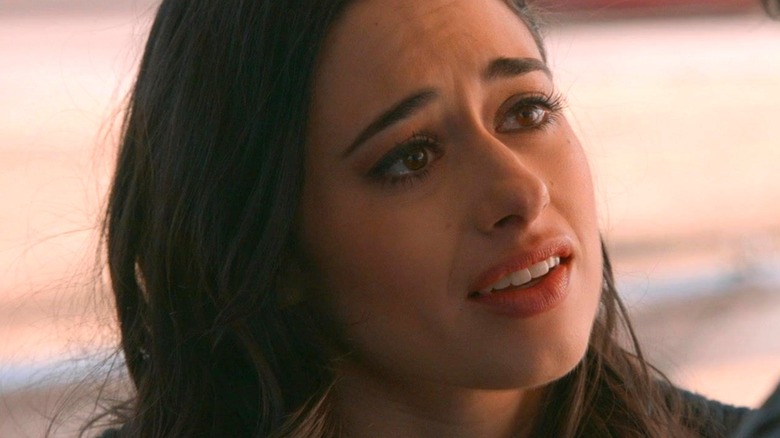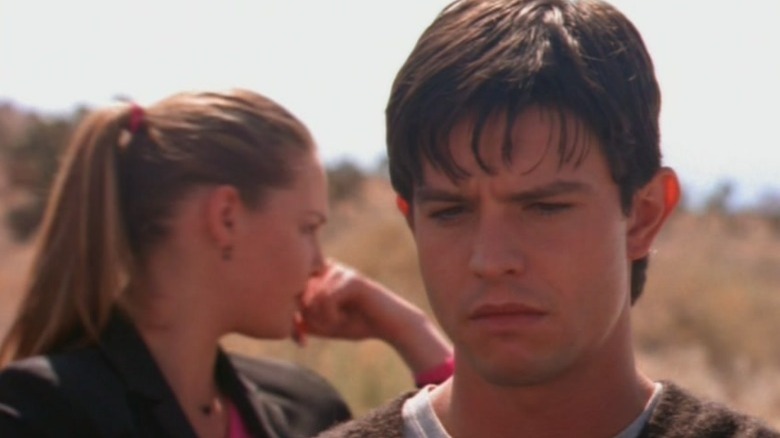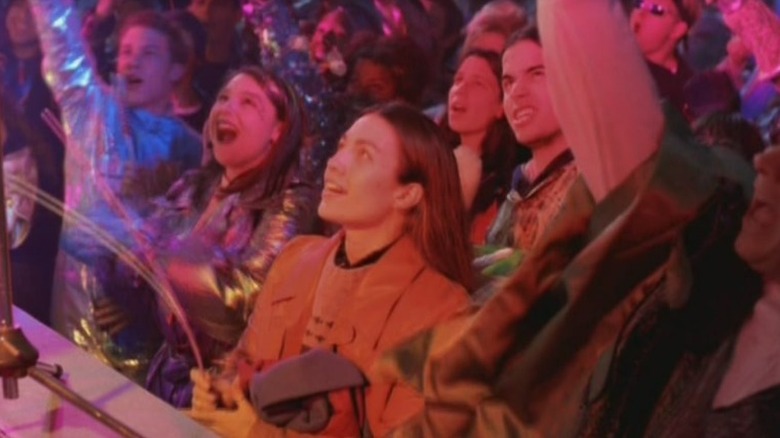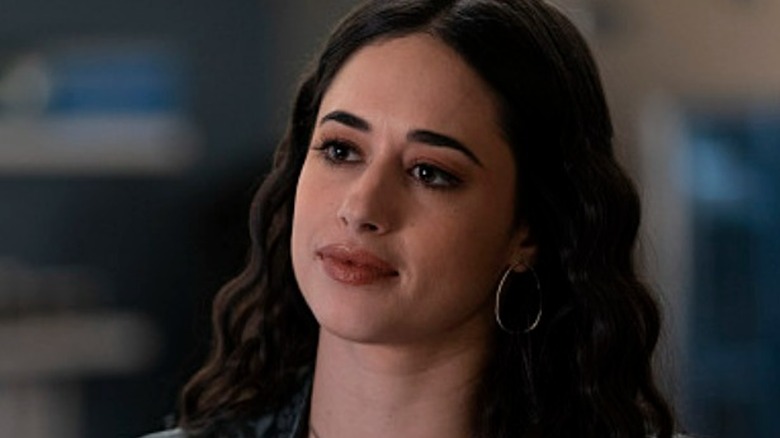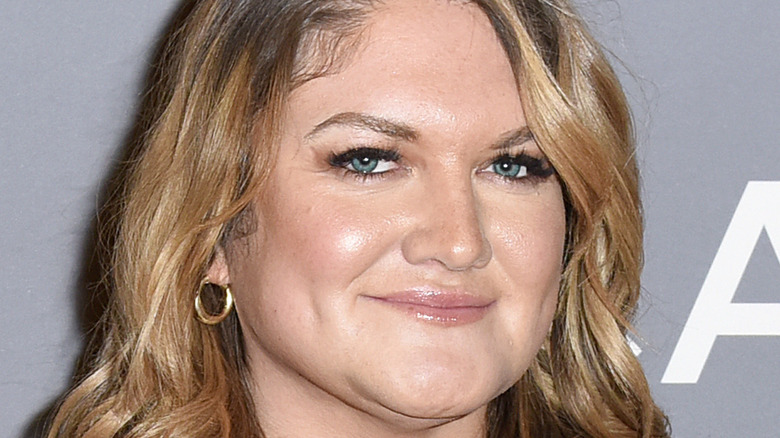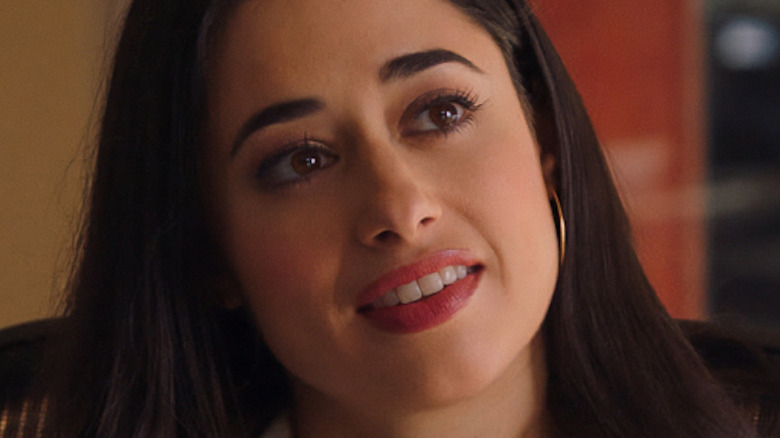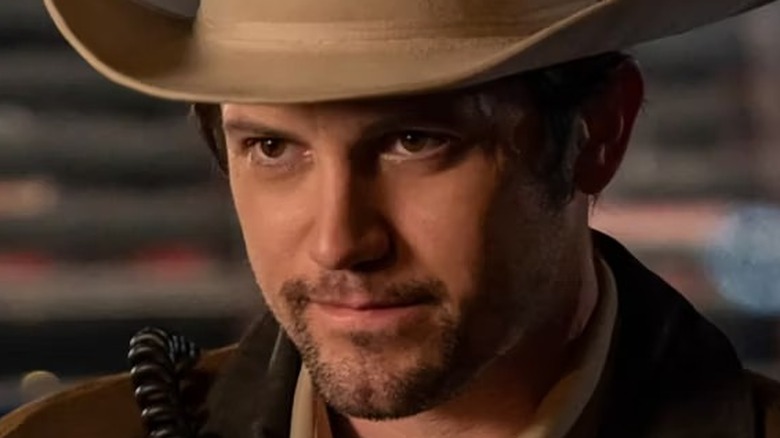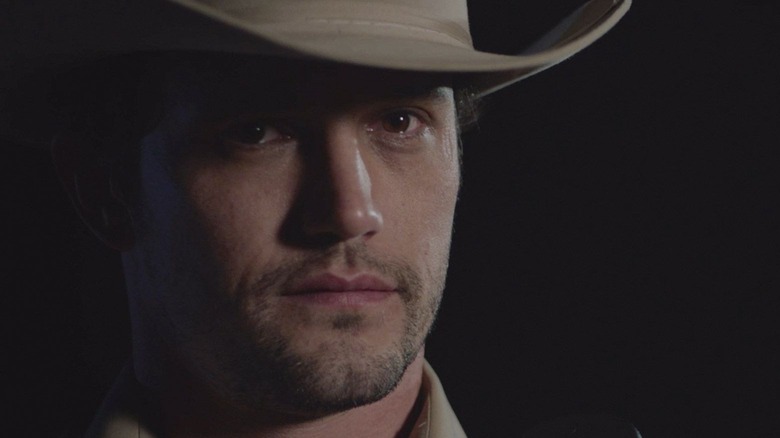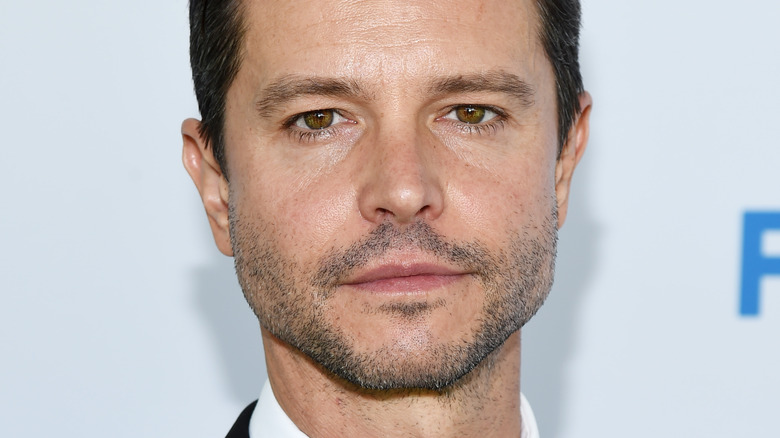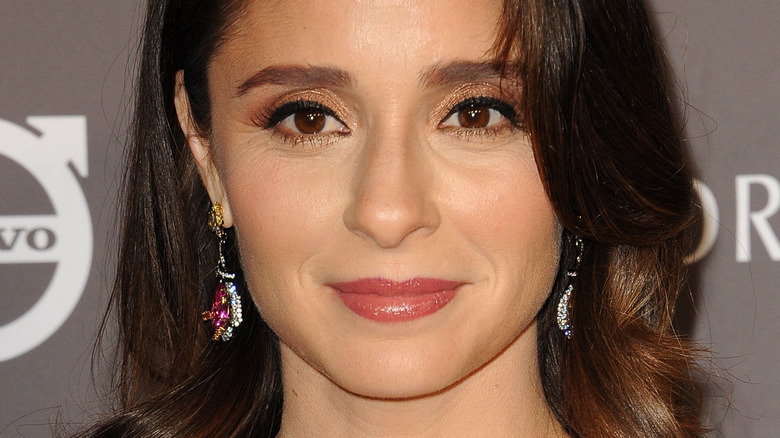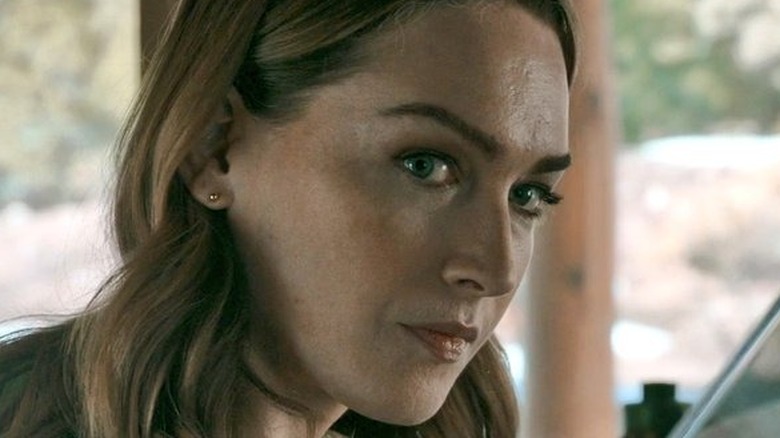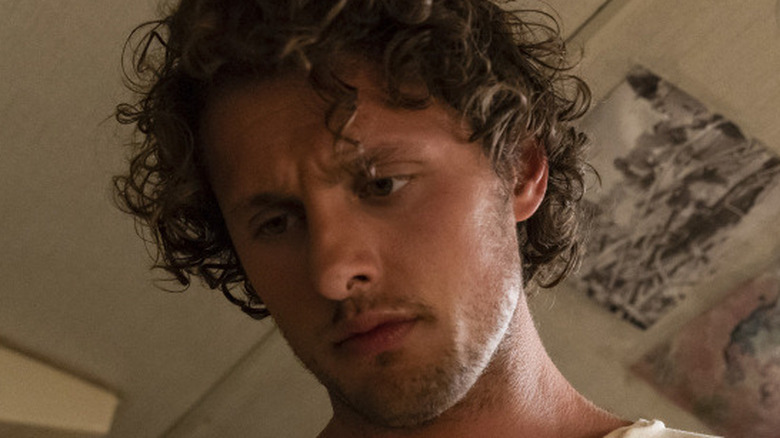The Untold Truth Of Roswell, New Mexico
When it started airing in 2019, "Roswell, New Mexico" gained a following, though it seemed like a familiar premise to some. That may be because it's a reboot of a show from 1999 that was on The WB and UPN, the stations that later became The CW. While the two shows share a premise and almost a name, they both approach their subject with a different perspective, as the more recent version introduces more modern social issues while including more from the source material.
Even though there are now multiple seasons of "Roswell, New Mexico" on the books, there still may be things even the biggest "Roswell, New Mexico" fans don't know about the series — both behind the scenes and on-screen. From unfortunate episode edits to the scene that fans agree went too far, there are many secrets hiding in New Mexico, and it isn't just the aliens and their spaceship. There was even a grassroots campaign to ensure Warner Bros. continued the original series after its 1st season, not unlike the way fans of the CBS series "Jericho" sent peanuts to the executives to ensure the show would be renewed (via CNET). Here are the untold secrets behind "Roswell, New Mexico."
It's a reboot of another series
As noted, "Roswell, New Mexico" isn't the first show of its kind. It isn't even the first to air on a Warner Bros. owned station. In 1999, "Roswell" aired, running for two seasons on the now-defunct network The WB before switching to the also defunct UPN for a final season in 2001. It starred Shiri Appleby as Liz and Jason Behr as Max.
"Roswell" went through its ups and downs, with fans worried it would be canceled after a single season. To show their love for the show, they sent bottles of Tabasco, the hot sauce popular with the aliens, to petition the network to keep the series. "We sent in a bulk order of 700 bottles of Tabasco last week," "Roswell" fansite owner Darien Wilson told the New York Post in 2000. Their campaign worked, and The WB moved it to a better timeslot and brought on staff to give the series more science-fiction elements.
Ronald D. Moore, known for his work with "Star Trek," joined the series in its 2nd season as a writer and executive producer to help push that new emphasis. The 1st season was relationship-driven, and the new writer didn't want to remove that aspect as the show shifted. "There is a balance between the relationship aspect of the show and the science fiction elements," Moore told Mania in 2000 when discussing the 2nd season's direction. "And when those elements are in balance, the show really has hit its stride."
Both shows are adapted from a series of ten books
In 1998, Pocket Books, a division of Simon & Schuster, began publishing the "Roswell High" series. The ten-book series follows Liz, Max, and their friends and family on their adventures in high school and in Roswell, New Mexico. The pilot of "Roswell" actually follows the plot of the first book, "The Outsider," pretty closely, based on a review by Jenny Atkins in The International Writers Magazine.
In an archived interview with BBC Cult, series author Melinda Metz and editor Laura Burns describe how the series came to exist. A vice president with Pocket Books came up with the idea, and then Burns was tasked with fleshing it out. The two originally met when they worked with a different publishing company. "Basically I came up with the characters and the set-up and rough outlines of plots," Burns describes in the interview. "Then, because Melinda was going to be a writer ... I was able to hire her to write the books."
The television rights were sold on the manuscript Metz wrote, and the series was published alongside the show. Metz and Burns were made staff writers on "Roswell," which meant they had the chance to develop the adaptation while writing the books. A total of 10 books were eventually published, which helped fill in the gaps between seasons and pick up where the show ended.
Series lead Jeanine Mason credits her athletic background to her acting success
Those familiar with the series may recognize Jeanine Mason, who plays series lead Liz Ortecho, as Dr. Sam Bello from "Grey's Anatomy." Her character was memorably rushed to Switzerland so she wouldn't be deported over running a red light. She also appeared on the ABC Family (now Freeform) series "Bunheads." What fans of "Roswell, New Mexico" may not know is how Mason first started on television and how she credits that experience with her work today.
At 18 years old, Mason won the 5th season of the popular dance competition "So You Think You Can Dance." Her success spurred her to begin acting. "Acting is my life now," Mason shared in an interview with Entertainment Weekly after her win. "I can't wait to move out here and start dancing and acting and auditioning ... as long as I'm performing, I'll be happy."
The actress credits her dance background as why having a coach is important to her on set and how she keeps her energy during filming. "I'm just someone who operates as an athlete, as well as an artist, in whatever I'm doing," Mason commented to Collider. "So, it makes sense to me to have coaches." Later in the interview, she discusses that "because [dance is] the athlete and the artist together," it helps prepare her for filming scenes and puts her in the right frame of mind.
The show creator wasn't interested in color-blind casting
"Roswell, New Mexico" creator Carina Adly Mackenzie had a vision as she developed the series. "I don't believe in color-blind casting," Mackenzie detailed to Entertainment Weekly. "I want characters' experiences to reflect their ethnicity." When she was initially approached about "Roswell, New Mexico," she was unsure. Learning that Liz was white-washed in the first adaptation spurred Mackenzie to move forward.
In writing and developing the reboot, the former showrunner knew who she wanted the characters to be and wrote them to reflect the books more than the first adaptation had. "I wanted Maria to be black, I wanted Kyle to be Mexican, and I wanted Alex to have Native American heritage, just like in the books," she shared in the same interview. However, she did want the aliens (Max, Isobel, and Michael) to be white, and wrote a letter to the executives detailing why, though she hasn't shared what she said in it.
While working, she and her team reached out to Define American, which features a still from the series on its homepage. The organization describes itself as "a culture change organization that uses the power of narrative to humanize conversations about immigrants." The new show features storylines regarding immigration, particularly that Liz's father is an undocumented immigrant. Define American works with networks to tell authentic immigrant stories, even offering a reference guide, which also features stills from "Roswell, New Mexico," on what language to use.
Returning Liz to her roots
Liz Ortecho, as she was written in the books, is a Spanish teenager born to two parents that run the Crashdown Cafe. When the books were adapted for television in the '90s, Liz Ortecho became Liz Parker, erasing the heritage and culture that was associated with the character. While Liz wasn't the only one to have a name change with the adaptation, it did take away an important part of who she was.
While "Roswell, New Mexico" gives Liz back her heritage, it is in a bit of a different way, making it more politically and socially relevant to the times. The character is Mexican, the daughter of undocumented immigrants who have been living in Roswell for over three decades. Giving the character back her Latina identity was a goal from the beginning. "There was a line I wrote for the audition sides," creator Carina Adly Mackenzie described to Entertainment Weekly. "A police officer accuses Liz of being combative, and she replies, 'I'm a Mexican-American woman in 2018. I engage in combat by getting out of bed in the morning.'"
While there are some changes to Liz's story to better reflect current issues involving her culture, the scientific side of Liz's character remains consistent across the two television adaptations. In "Roswell," she analyzes some of Max's saliva, notices his abnormal cells, and confronts him, only to find out the truth. In the new series, Liz, already a working scientist, uses DNA from a straw to discover his cells don't look the way they should.
The show creator used personal experiences to write Max's story
In an interview with Entertainment Weekly, Mackenzie says that "'Roswell, New Mexico' is my show, but Liz's story is not my story." She later goes on to say that her story is better reflected in the alien characters of the series.
Mackenzie is the daughter of an Egyptian-American Muslim mother. Though she is not a practicing Muslim today, as a teenager, she didn't always share her religion with her peers. After September 11, 2001, an adult at school shared information about her religion, sharing it as though every Muslim believed the ideals of the individuals that committed the act. It was then that Mackenzie shared what her religion was with her class. After that, she experienced several Islamophobic actions, including the use of slurs and locker vandalism.
Mackenzie admits she didn't necessarily look Arab to her classmates, and that's what she shares with Max Evans (Nathan Dean Parsons). "When we meet Max, he has thus far enjoyed the privilege of appearing to be a straight cis white man," she detailed in the interview. "A guy who personifies the good ol' boy swagger that so many seem to view as the American ideal." He looks just like everyone else despite what makes him different. Both he and Mackenzie can pass for something that gives them a certain status in society, and the writer channeled that experience when developing Max's character.
The Season 1 cliffhanger was part of the original pitch
The Season 1 cliffhanger that resulted in a major character's death was planned from the start. "This was actually part of my pitch ... from the very beginning," Mackenzie told Collider. "It was the plan from the beginning, so they knew where we were going." The series starts with Max saving Liz from a bullet wound, and the show creator didn't want everyone to be saved by him when the show features a female protagonist.
While Mackenzie knew where she wanted to go, Nathan Dean Parsons didn't always know what was in store for his character. "Obviously, you never know for sure until it's on the piece of paper in front of you," Parsons shared in an interview with Collider. "But I had an inkling of it."
However, his death didn't mean the actor wasn't still involved until his return in Season 2. "We did find interesting ways to use him throughout the season, whether it's nightmares or flashbacks," Mackenzie mentioned in a separate interview with Collider. She goes on to say they used Parson as the hands of a not-yet-cast character and as shadowy figures without faces. She would call him up to come out to set for what they needed, which only worked because he lived in New Mexico, where the series was filming.
The cameo from the original Max happened after a conversation at a birthday party
Jason Behr, who played Max in "Roswell," returned to the franchise as recurring character Tripp Manes in Season 2 of "Roswell, New Mexico." How did the series score the cameo? According to Mackenzie, it all started at a birthday party. "I met Jason at Julie Plec's birthday party," the show creator shared with Collider. "And literally sat talking to him for five hours." Even after the party wound down and the guests had gone home, the two were still talking about their work. Behr let her know he had watched the first season of the reboot and told Mackenzie to reach out if she wanted him to ever do a cameo.
"I didn't think he was serious," she continued. "But I thought it was worth a try." When a character came up that she thought could work for Behr, she reached out. The former showrunner wasn't sure if he wanted to return in the capacity the character required but remembered how excited she was when reaching out to Behr. The two worked together to develop Manes' detailed backstory, as the character eventually became a key part of the season. "He was immediately one of the gang," Mackenzie says about Behr integrating with the rest of the cast. "And we put him through the ringer. He did not have an easy time on the show ... he never didn't have a smile on his face doing it."
Behr wasn't the only original cast member to make a cameo
The original Max wasn't the only one to make an appearance in the reboot, as the original Liz made a cameo too. Shiri Appleby returned to the franchise in a different capacity than Behr, though fans can still catch her on screen. She makes a cameo as the character Allie in the Season 3 episode "Never Let You Go," but that was after she directed two episodes of the series.
Appleby has directed episodes for a variety of shows, from "Young Sheldon" to "Pretty Little Liars: The Perfectionists." Before she returned as a character in the "Roswell" universe, she directed episodes in the first two seasons, starting with the Season 1 episode "Songs About Texas" and continuing in the Season 2 episode "What If God Was One of Us?". She called being on the set a "full circle" experience in an interview with Entertainment Tonight.
Mason spoke about her excitement to learn from the veteran actress with Collider. "Every time she's there, it's fun to just pick her brain and get her advice," the new Liz said. Being directed by the original Liz has inspired Mason to direct more in the future. She has previously directed some theater and has found inspiration in the medium since moving to New York. Appleby encouraged the move, Mason noting that the actress's response when she asked her about it was, "Oh, h*** yeah, go to New York."
The series was always meant to be centered on social issues
As a science-fiction show, "Roswell, New Mexico" was always going to be focused on the issues of the time. "That is the history of sci-fi, and that is why we love sci-fi, to actually be living metaphors for cultural issues," Mason shared with CBR. "And that was the thing that made me most excited about getting to work in sci-fi with this show." The series certainly deals with current cultural issues, specifically those regarding Liz's heritage and her father's immigration status.
Mason also argues that having a female character in the lead role inherently makes the show political. "When we started, the idea to exist as a Latina you can choose to not be political is a farce," the actress continued. "Our existence as women is political." With a Latina woman in the leading role, there was no way for the series to not be political or to not mention important social issues facing those that share those identities.
The series included representation of other identities as well, featuring the transgender character Charlie Cameron, played by transgender actress Jamie Clayton, in Season 2. While her trans identity is not essential to the character or the story, as noted by Mackenzie on Twitter, its representation is in keeping with today's world.
The show creator was not informed of a crucial scene removal for foreign broadcasting
While representation was added, it wasn't always left in. When ITV picked up "Roswell, New Mexico" to air on ITV2 in the United Kingdom, it should've been good news for the showrunners, cast, and crew. However, after only two episodes, problems popped up. Mackenzie took to Twitter to express her frustration that a love scene between Michael (Michael Vlamis) and Alex (Tyler Blackburn) was cut in the U.K. broadcast of Season 1 episode "So Much for the Afterglow."
"Really, really, REALLY upset to hear that [ITV] cut out a (pretty tame) love scene between two men and kept a (much more raunchy) heterosexual sex scene in their airing of an episode of ['Roswell, New Mexico'] tonight," Mackenzie wrote. ITV shortened the episode by at least two and half minutes (via Fandom). The scene in question cuts off as Michael pushes Alex onto a bed, jumping straight to the final scene.
Other changes in the episode include sped-up monologues, a line from Wyatt (Dylan McTee) is cut, and the episode as a whole is sped up. The show creator states that the scene was "a major part of a long term character arc," in a response to her tweet, meaning U.K. fans would have to wait until the unedited episode was available on a streaming platform for a complete picture.
